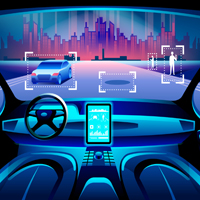Autonomous Cars
January 8, 2019 Auto industry enthusiasts have been anticipating the day when autonomous vehicles will be out on the open road. With help from a recent decision by American auto safety regulators, that day may be coming sooner rather than later.
Auto industry enthusiasts have been anticipating the day when autonomous vehicles will be out on the open road. With help from a recent decision by American auto safety regulators, that day may be coming sooner rather than later.
Getting Autonomous Vehicles on the Road
Autonomous cars are self-driving vehicles that operate without standard devices including brakes or steering wheels. Traditional automobiles must meet over 70 auto safety standards before they can be certified safe for road driving. Since many of these standards are drafted with the understanding a licensed driver would be controlling the vehicle using traditional human control means, it has been difficult for most autonomous vehicles to meet these requirements. That may be about to change.
The U.S. National Highway Traffic Safety Administration (NHTSA) recently announced it would be streamlining the standard review process for autonomous vehicles. To speed up the timeline for getting self-driving cars onto the roadways, the NHTSA has eliminated some of the previous requirements, including a mandate that a safety petition must be found complete by the NHTSA before it can be made available for public comment. Allowing public comment earlier is meant to improve the efficiency and transparency of the safety review process.
As part of the streamlined process, autonomous car manufacturers can file for an exemption for vehicle safety standards if they can demonstrate their self-driving cars are at least as safe as existing vehicles. The vehicle standard safety exemption is available for up to 2,500 vehicles. General Motors already has filed its petition with NHTSA seeking an exemption to allow use of fully automated vehicles in a planned 2019 deployment of a new ride-sharing fleet.
Safety Risks of Streamlining Autonomous Vehicle Approvals
The potential safety implications of speeding up the approval process should not be ignored. Autonomous vehicles placed on the road without proper safety testing could result in an increase of motor vehicle accidents. Adequate safety testing generally takes several years and the increased push for streamlined approvals could shorten the time available to conduct needed safety evaluations.
Defective sensors or vehicle communications technology can result in serious motor vehicle accidents in self-driving cars. The NHTSA has recognized the importance of vehicle communications technology for the safe use of autonomous vehicles by requesting comments on this issue as part of its new regulations. Discussions also continue between the U.S. Transportation Department and the Federal Communications Commission on the priority use of designated spectrums for transportation safety communications. Allowing self-driving cars to take to the roads before the wireless communications issues are resolved could be disastrous.
Without human control as an integral part of the driving process, autonomous vehicles rely solely on the manufactured car parts to keep drivers safe. In addition to cameras, computers, and radar units, self-driving cars use a specially manufactured “lidar unit” which uses spinning laser beans to generate 360 degree images. When a defective car part causes a motor vehicle crash, the car manufacturer may be liable fo/attorneys/r the resulting damages under products liability law.
Philadelphia Car Accident Lawyers at Galfand Berger LLP Pursue Maximum Compensation for Your Injuries
If you or a loved one has been injured in a car accident, the experienced personal injury lawyers at Galfand Berger LLP can assist you in filing a products liability claim against the car manufacturer or other responsible party. We represent car accident victims throughout Pennsylvania and New Jersey including those in the Philadelphia, Reading, Bethlehem, Allentown and Harrisburg areas. To schedule a free consultation with an experienced Philadelphia car accident lawyer, call us today at 1-800-222-USWA (8792) or submit an online inquiry form.
 Google Screened
Google Screened
